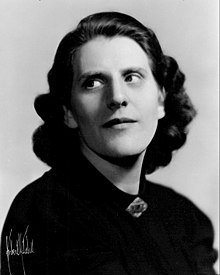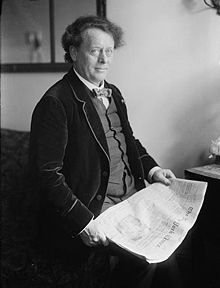
The Conductor is the English title of a Dutch historical and biographical drama (based on a
true story) which premiered in 2018. The title refers to the Dutch-born American
pianist Antonia Brico who was the first female conductor of a philharmonic or
symphonic orchestra. Here is some basic information about this drama:
** Original
Dutch title: De Dirigent
** Writer and
director: Maria Peters
** Music
composed by Quinten Schram and Bob Zimmerman
** Languages
spoken: Dutch, English, German
** Run time: 139
minutes
The cast
includes the following:
** Christanne de
Bruijn as Antonia Brico (1902-1989)
** Gijs Scholten
von Aschat as Willem Mengelberg (1871-1951) – a famous Dutch conductor
** Richard
Semmel as Karl Muck (1859-1940) – a famous German conductor
** Scott Turner
Schofield as Robin Jones – an American jazz musician
** Seumas F.
Sargent as Mark Goldsmith – an American music teacher
** Carole Street
as Eleanor Roosevelt (1884-1962) – wife of US President Franklin Delano
Roosevelt
** Benjamin
Wainwright as Frank Thomsen – manager of a concert hall in New York – a
fictional character
** Annet
Malherbe as Mrs Wolthuis - Antonia’s stepmother
** Raymond Thiry as Mr Wolthuis - Antonia’s
stepfather
Since this drama
is based on a true story, the basic facts are part of the public record. They
are not a secret. Therefore I feel free to mention some of them in this review.
While this drama
is based on a true story, it is not a documentary film. It is a dramatized
version of events. Not everything happened exactly as shown here. But the basic
story is true.
Here is a brief
biography:
Antonia Brico
was born in the Netherlands in 1902. Her biological mother gave her up for adoption
when she was still an infant. She was adopted by a Dutch couple, Mr and Mrs
Wolthuis, who gave her the name Wilhelmina Wolthuis.
In 1908, the
Wolthius family immigrated to the US. They settled down in California where
Antonia (Wilhelmina) grew up and went to school. In 1912, at the age of 10, she
began to take piano lessons. Soon it was clear that she had a great talent for
the piano.
In 1919, when
she graduated from high school, her stepmother told her that she was adopted.
She also told her that they had given her a new name when she was adopted.
Antonia was so upset to learn these facts about her life that she walked away
from her foster parents and never had any contact with them again.
In 1919 she
enrolled into the University of California at Berkeley where she studied music
and foreign languages. She graduated in 1923 with a BA in music. After
graduation she decided to move to New York to start a new life. In 1924 she
began to use her real name Antonia Brico.
As a young child
she had dreamed of becoming a concert pianist. As a teenager she found a new
dream: she wanted to become a conductor. But when she talked about this dream,
most people told her it was impossible and unrealistic.
They said: a
woman cannot be a conductor. There are no female conductors anywhere in the
world. Forget it! However, Antonia could not give up on her dream.
In 1926, she
travelled to the Netherlands to see if she could find some members of her
biological family. While she was there, she met the famous Dutch conductor
Willem Mengelberg. She wanted to study with him. He told her it was not
possible, but he still wanted to help her. He suggested that she should go to
Germany and meet with the famous German conductor Karl Muck. Maybe she could
study with him? He wrote a letter of introduction that she could give to the
German conductor.
In 1927 Antonia
travelled to Germany where she met with Karl Muck and asked if she could study
with him. At first he said no. But she insisted and after a while he accepted
her. She stayed in Germany to study for her dream job. In 1930 her dream became
true: she conducted the German Philharmonic orchestra. It was the first time a
woman had done this.
In 1932, Antonia
returned to the US where she worked as a conductor in several locations. She
was lucky to have the support of several important and well-connected people,
including the First Lady, Eleanor Roosevelt.
But there still
was one problem: whenever she had a job, it was always just one or two
concerts. Nobody wanted to give her a permanent position, because she was a
woman!
In 1942 she moved
to Denver, Colorado. This place became her main base for the rest of her life.
She died there in 1989.
What about the
movie? The movie is about Antonia Brico, but it does not cover her whole life
from the beginning in 1902 until the end in 1989. The focus is on the 1920s and
the 1930s.
** The drama
excludes the first part of her life (1902-1926), more than twenty years
** The drama
excludes the last part of her life (1940-1989), more than forty years.
In the drama, we
follow Antonia’s life and career during the 1920s and the 1930s. When the drama
begins, the year is 1926. The location is New York where she works as an usher
in a concert hall. She is not a musician; she is not a conductor. Working as an
usher in a concert hall is as close as she can get to her dream.
Antonia is 24.
She still lives with her foster parents. Every week when she is paid for her
work, she must go home and hand over her salary to her stepmother.
In 1926, when
she is told about the adoption and the change of name, she decides to go to the
Netherlands to look for members of her biological family. She is too late. Her
mother is dead.
While she is
there, she meets the famous Dutch conductor Willem Mengelberg who writes a
letter of introduction for her. He tells her to go to Germany and see if she
can study with the famous German conductor Karl Muck.
In 1927 she
travels to Germany where she meets with Karl Muck. At first he says no. He does
not want to accept an apprentice, but she does not give up and after a while he
allows her to study with him.
In 1930 her
dream finally comes true: she conducts the Berlin Philharmonic Orchestra. When
she returns to the US, she is able to work as a conductor in several locations,
but only for one or two concerts. She cannot get a permanent job as a
conductor.
This is what we see in the drama.
When you compare the movie with the brief biography above,
you can see that not everything in the drama is accurate, but the basic story
is true.
What do
reviewers say about this drama? Here are the results of two review aggregators:
70 per cent =
Rotten Tomatoes (the general audience)
72 per cent =
IMDb
As you can see,
the ratings are not bad. On the other hand they are not great. They are
somewhere between three and four stars on Amazon. I can understand why.
Antonia’s life is unusual, colourful and interesting, but the movie about her
life is rather disappointing. There are a number of flaws:
** The
chronology of events is inaccurate – an example: Antonia was not living with her
foster parents in New York in 1926; she walked away from them seven years
before (in 1919)
** Basic facts
are distorted – an example: Antonia was not told about the adoption and the change
of name in 1926; this happened seven years before (in 1919)
** Basic facts
are excluded – an example: details about her stay in the Netherlands and about
members of her biological family
** Fictional
details are introduced – an example: a love story
** A fictional
character is introduced – an example: Frank Thomsen, manager of the concert hall
in New York
It could have been a great movie. Unfortunately, it is not. This drama is not great; it is not even good; it is average and therefore it cannot get more than than three stars (a rating of 60 per cent).
PS # 1. Maria
Peters (born 1958) worked on this project for more than ten years. It is a shame she did not use the time to write a script that is
historically accurate. Why is historical truth violated in so many ways?
PS # 2. For more
information, see the following items:
** Antonia: A
Portrait of the Woman is a documentary film which premiered in 1974. Director:
Judy Collins, who studied with Antonia Brico when she was young. Run time: 58
minutes. This film is available online.
Unfortunately,
the copy which is posted online suffers from poor technical quality. What is
wrong? The speed is not constant. The sound of the music is distorted in a
horrible way. But the interview parts of the film are quite interesting and give
good insight into Antonia’s life and career.
** I Will Not Be
Deflected From My Course: The Life of Dr Antonia Brico by Lance Eugene
Christensen, a dissertation, Master of Humanities, Colorado University, 2000.
140 pages. This dissertation is available online (PDF).
*****

Antonia Brico (1902-1989)
A photo from 1940
*****

Willem Mengelberg (1871-1951)
A famous Dutch conductor
*****

Karl Muck (1859-1940)
A famous German conductor
*****
No comments:
Post a Comment